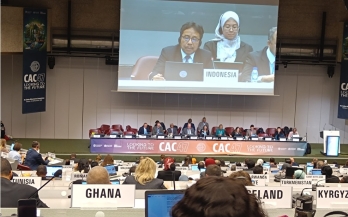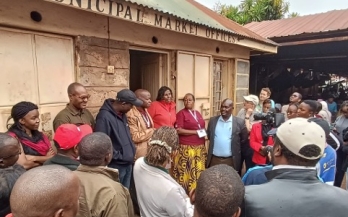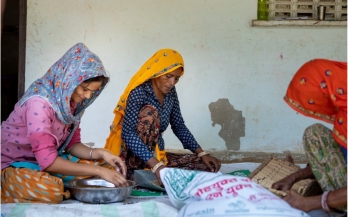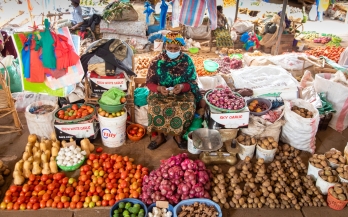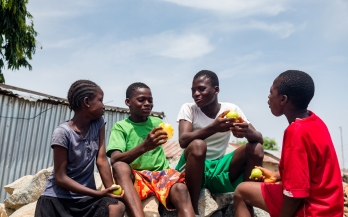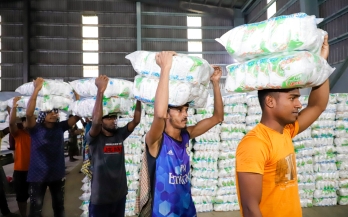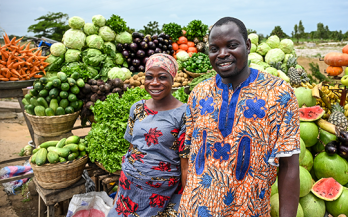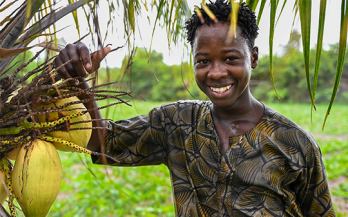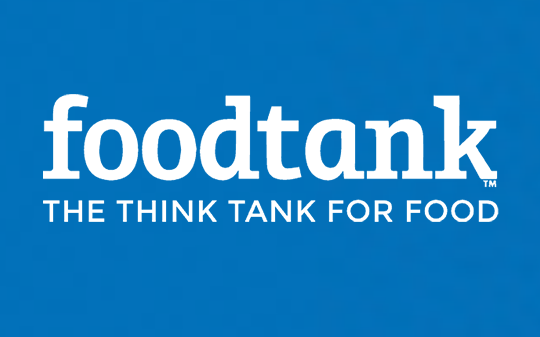- 05/02/2025
Many low-income, food insecure, and malnutrition-vulnerable communities in Africa, Asia, and Latin America rely on traditional markets to access nutritious fresh food. However, contaminated fresh foods in markets put the well-being of consumers at risk by compromising their uptake of nutrients, needed for proper growth and health. Unsafe food also contributes to food waste and can raise food prices and lower market vendors’ profits. Improving hygiene in traditional food markets is thus vital to improving nutritional outcomes for consumers in low- and middle-income countries and can positively contribute to market vendors’ livelihoods and sustainable local food systems. In 2022, GAIN initiated a process to champion global Guidelines for Food Hygiene Controls in Traditional Markets for Food through the Codex Alimentarius Commission (CAC), where GAIN is an observer organisation Those Guidelines were adopted in November 2024.
- 29/01/2025
The public sector plays a crucial role in transforming food systems through leadership, structures, and processes like policies and budgets as well as the extent to which it enables a whole-of-society approach. Understanding public-sector governance is thus fundamental to designing and implementing food systems transformation initiatives. This working paper provides an overview of public sector governance at the country level, with a food systems lens.
Public governance models vary across countries, and understanding these is vital for addressing challenges and trade-offs and leveraging opportunities in food systems. Local governments, including city governments, have close relationships to the daily lives of residents and landscapes. This makes them key players in bringing together multiple stakeholders, implementing locally relevant solutions, and strengthening capacity through sharing best practices, tools, and lessons learned via city-to-city networks. In a similar way, global food systems-related fora can provide opportunities for national, sub-national, and local governments to enhance the evidence base on food systems transformation and shape wider food systems outlooks.
GAIN, CIMMYT, FAO and the US State Department to discussed The Vision for Adapted Crops and Soils (VACS), drawing on their shared knowledge and work in demand creation around healthier and more sustainable diets. Read the transcript and watch now.
- 20/01/2025
Reducing food waste represents an important opportunity for shrinking the environmental footprint of food systems and supporting planetary health – and if this waste can be repurposed into nutritious foods, then it could also be a benefit for nutrition and human health. To understand the opportunities for repurposing waste products or byproducts into foods, this paper presents a rapid analysis based on desk research and key informant interviews. The analysis considers byproducts across four categories: fruit and vegetable residues, seeds and seed residues, other plant byproducts, and animal byproducts. The assessment considered availability, potential uses, consumer acceptability, food safety, nutritional quality, and feasibility.
- 16/01/2025
Micro, small, and medium-sized enterprises (MSMEs) play a pivotal role in addressing Nigeria’s nutrition challenges, given their significant contribution to the local food system and economy. MSMEs are essential drivers of innovation, employment, and food production, helping make nutritious foods more accessible to underserved populations. However, MSMEs face an array of systemic barriers that hinder their growth and ability to scale sustainable nutrition solutions, such as high costs, complex regulations, and restricted access to finance. To bring together policymakers and the private sector to discuss these challenges, a Nutrition Policy Dialogue was convened by GAIN and the Scaling Up Nutrition Business Network (SBN) in Abuja on October 31, 2024. Attendees included the Regional and State Hub leads for SBN in Nigeria as well as representatives from businesses, government departments, academia, civil-society organisations, and other key stakeholders.
Through a keynote address, a panel discussion, and two breakout groups, the meeting highlighted key challenges, including regulatory overlaps, limited financial access, and policy inconsistencies affecting MSMEs. It also proposed actionable recommendations such as harmonising regulatory frameworks, developing cluster-based financing models, and enhancing financial literacy. Finally, it served to foster stakeholder commitments to training programs, advocacy efforts, and implementation of innovative financing solutions.
- 14/01/2025
Millions of people around the world struggle to afford minimally nutritious diets, and social protection is critical for making healthy diets accessible. GAIN supports governments and other key stakeholders to accelerate system innovations that can make social protection investments work harder for the nutrition of the most vulnerable.
Through partnerships, policy advocacy, and programmes, GAIN is working in seven countries to make social protection systems more nutrition-sensitive and better equipped to combat systemic and intergenerational inequities that limit the reach of vital services.
- 14/01/2025
Workforce Nutrition Programmes (WNPs) can improve the health of workers, but with
mixed results for a business case—which is crucial to their sustainability. This paper thus
explores impact pathways and metrics used to assess the business benefits of WNPs, as
well as the factors that influence the business case, with the aim of informing future
interventions and research.
- 14/01/2025
Food systems are a foundation of human and planetary well-being and central to achieving the Sustainable Development Goals. Yet they also contribute to ill health, inequity, environmental degradation, and greenhouse gas emissions. These challenges demand urgent food systems transformation. Such a transformation requires understanding the status of food systems across their diverse functions.
The benefits of trade are often viewed in economic terms, but its human impact — on malnutrition in particular — cannot be ignored. Malnutrition stunts development, weakens immunity, and deteriorates bone and muscle health.
